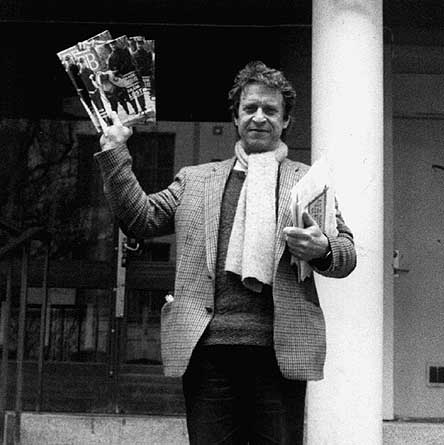
Jag vill säga några ord om folkrätten och säkerhetsrådets beslut om Libyen. Folkrätten är framförallt FN-stadgan. Den kom till vid andra världskrigets slut för att bidra till att förhindra nya krig mellan stater. FN skall bidra till att upprätthålla internationell fred och säkerhet, krig skall inte vara sättet att lösa konflikter mellan stater och de inrikes konflikterna skall vara varje stats egen angelägenhet.
Libyen var före Libyenkriget 2011 ett i högsta grad fredligt land som inte hotade några andra stater.
Det fanns inre konflikter i landet, men det var de västliga stormakternas inblandning i Libyens affärer som skärpte de interna motsättningarna i landet.
Mycket kort tid efter oroligheter i östra Libyen i början av 2011 övergick konflikten till ett inbördeskrig som forcerades fram. Men det var alltjämt fråga om ett inbördeskrig som inte var något hot mot internationell fred och säkerhet.
De västliga stormakterna drev på för direkt intervention i det oljerika Libyen, och FN:s generalsekreterare Ban Ki-moon skapade allmän opinion med groteska jämförelser mellan denna interna konflikt och det nazistiska Tysklands judeutrotning. Det som helt klart var en väpnad upprorsrörelse i Libyen kallades för en civil opposition och Gaddafi demoniserades på känt manér som ondskan själv.
Libyens chargés d'affaires i FN Ibrahim Dabbashi hoppade av den 21 februari 2011, den 25 februari även Libyens FN-ambassadör Abdel Rahman Shalgam. Varken Dabbashi eller Shalgam hade därefter alltså inte längre någon fullmakt att tala för Libyen i FN. Samtidigt begärde Dabbashi att säkerhetsrådet skulle sammanträda och vidta åtgärder mot Libyen. Tvärt emot reglerna fick han behålla sin FN-legitimation och inbjöds att framträda på säkerhetsrådets möte som representant för Libyen. Libyens lagliga representanter i FN avsattes alltså av generalsekreterare Ban Ki-moon med stöd av västmakterna.
När Libyen försökte ersätta de avhoppade libyska diplomaterna i FN med legitima regeringstjänstemän, vägrade USA att bevilja visum för inresa i USA, i strid med sina förpliktelser som värdland för FN. Enligt artikel 32 i FN-stadgan skulle Libyen som anklagad medlemsstat ha inbjudits till säkerhetsrådet, men så skedde alltså inte.
Säkerhetsrådet beslöt genom resolution 1970 den 26 februari om hårda sanktioner mot Libyen och gav ett uppdrag till Internationella brottmålsdomstolen att Gaddafi skulle åtalas, trots att säkerhetsrådet inte hade något stöd i FN-stadgan för att besluta något sådant. När beslutet antogs (utan att en undersökning gjordes, som proceduren föreskriver enlit säkerhetsrådets praxis) så fanns det två rekommendationer till säkerhetsrådet, en från Arabförbundet och en från Afrikanska unionen. Rådet valde att lyssna på Arabförbundet, medan Afrikanska unionens försök till medling i Libyen avvisades.
Den 17 mars 2011 antog FN:s säkerhetsråd resolution 1973 som öppnade för militära insatser mot Libyen. Bara någon dag senare startade USA och dess allierade bombkriget mot Libyen.
Säkerhetsrådet banade väg för en militär intervention från andra stater i en medlemsstats inre angelägenheter, i ett inbördeskrig som inte hotade internationell fred och säkerhet. Det får säkerhetsrådet enligt FN-stadgan inte göra.
I beslutet refererade säkerhetsrådet inte till ”humanitär intervention” - som nog var ett alltför ökänt begrepp som avvisats av en överväldigande majoritet av världens stater. Säkerhetsrådet hänvisade istället till det s k ”R2P”, Responsibility to Protect, ”ansvaret att skydda den egna befolkningen”, som generalförsamlingen uttalat sig för - på ett allmänt plan och uttunnat - men som inte ger rätt till intervention och som inte heller var relevant beträffande Libyen.
Interventionen handlade de facto om att byta regim i Libyen, och de västliga stormakterna understödde detta hela vägen fram till de beväpnade rebellernas och Natos specialstyrkors seger på marken i Libyens kuststäder.
Säkerhetsrådet struntade i vedertagna procedurregler:
- Libyen fick inte komma till tals i rådet innan krigsresolutionen antogs.
- Fredsinitiativ som initierades av bl a Afrikanska Unionen gavs ingen möjlighet - en delegation vägrades inresa i Libyen.
- Säkerhetsrådet spelade också ut kortet att åtal skulle väckas inför Internationella brottmålsdomstolen mot Gaddafi och andra, vilket förvrängde möjligheterna till fredliga lösningar.
Säkerhetsrådets hantering av Libyen-frågan i februari måste helt enkelt betecknas som ytterligt sjaskig. Den stred på en rad punkter mot FN-stadgan och var tydligt inriktad på krig i stället för fred.
Men man skall också komma ihåg att resolutionen hade mycket svag bas: de tunga staterna Kina, Ryssland, Brasilien, och Tyskland lade ned sin röst och samma stater har sedan kritiserat resolutionen. Efteråt har fokus dock knappast alls varit på resolutionens stadgevidrighet. Men Ryssland, som är vetoberättigad medlem av säkerhetsrådet, har - mot bakgrund av utvecklingen i Syrien - i rådet tagit avstånd från bombkriget mot Libyen och klargjort att säkerhetsrådets beslut mot Libyen inte får bli ett mönster för fortsatta interventioner.
Libyen-resolutionen är den allvarligaste attacken hittills mot FN-stadgans generella våldsförbud och förbud mot inblandning i medlemsstaternas inre angelägenheter.
Är Libyenkriget bara början på interventionskrig beslutade av säkerhetsrådet i strid mot FN-stadgan viktigaste bestämmelser? Motsvarande utveckling med västlig och annan stormaktsinblandning som i Libyen ser vi nu spelas upp i Syrien, men där har vetostaterna Ryssland och Kina hittills gjort klart att man inte kommer att acceptera samma utveckling.
Libyen får inte bli ett prejudikat. FN-stadgan måste försvaras mot de västliga stormakternas missbruk av stadgan. Om Libyen-kriget accepteras, så accepterar vi att krig blir det normala sättet att lösa konflikter.
Det har varit en rad krig i strid med folkrätten sedan FN grundades och FN:s säkerhetsråd har fattat många tvivelaktiga beslut när väl krigen har börjat. Men inte förrän nu har FN:s säkerhetsråd självt satt igång ett angreppskrig.
Protesterna mot Libyen-kriget har varit alltför få i västvärlden. Detta trots massiva bombningar av bostadsområden med (enligt uppskattning av jur prof Norman Paech) 40 000 civila dödsoffer, rasistiska lynchningar särskilt mot den svarta minoriteten i Libyen, lynchningen av statschefen Gaddafi och tortyr av fångar (som fått Läkare utan gränser att i protest upphöra med sitt arbete i interneringslägren i Misrata i Libyen).
Men får inte glömma att långt ifrån alla Nato-länder deltog i kriget. Men å andra sidan bör man också ha i minnet att Nato inte längre ens formellt är en försvarsorganisation av stater utan en angreppsmakt som den 24 april 1999 gav sig själv rätt att genomföra militära aktioner också utanför alliansens område – ”out of area”, dvs i hela världen.
Enligt rapporter finns trupper från Nato-alliansen fortfarande på marken i Libyen.
Det tog Nato åtta månader att besegra det sega folkliga motståndet i Libyens kustområden, upphäva den nationella kontrollen av centralbanken och ta kontroll över oljan. Motståndet tycks fortsätta. Jag hoppas att libyerna lyckas återupprätta Libyens suveränitet, som de gjorde för två generationer sedan. I så fall skulle de göra freden, FN-systemet och oss alla en stor tjänst.
© Erik Göthe/2012.01.28

International law, the UN Security Council and the war against Libya
Speech at meeting with Cynthia McKinney 28 January 2012 at Rinkeby, Stockholm
I would like to say a few words about international law and the UN Security Council decision about Libya. International law is primary the UN Charter. It was created at the end of WW2 in order to contribute to preventing wars between states in the future. UN is meant to contribute to uphold international peace and security, wars should not be the means to solve conflicts between states and the domestic conflicts should be the exclusive affair of each state.
Libya before the Libyan war in 2011 was clearly a peaceful country that did not threaten any other states.
There were conflicts in the country, but it was the interference by the western countries in the affairs of Libya that tightened up de internal contradictions in the country.
A very short time after unrest occurred in eastern Libya in 2011, the conflict turned into a civil war that was speeding up. It was, however, still a matter of civil war posing no threat to international peace and security.
The western powers pressed for direct intervention in oil rich Libya, and UN Secretary General Ban Ki-moon created public opinion by means of making grotesque comparisons between thes internal conflict and the extermination of jews in Nazi Germany. What clearly was an armed uprising in Libya was called civil opposition and Gaddafi was demonized in a well-knowned manner as the evil impersonated.
Libya's chargés d'affaires in the UNO Ibrahim Dabbashi defected on the 21th of Februari, on the 25th also the Libyan UNO ambassador Abdel Rahman Shalgam. So, Dabbashi and Shalgam had no longer any formal powers to speak for Libya in the UN. At the same time Dabbashi demanded that the security council convene to take actions against Libya. Contrary to the rules of the UN he was allowed to keep his UN papers and was invited to speak at the security council meeting as the representative of Libya. Libya's legal representatives in the UN were thus set aside by secretary general Ban Ki-moon supported by the western powers.
As Libya tried to replace the defected Libyan diplomats in the UNO with legitimate government officials, the US refused to grant them visa for entering the US, in contravention to its obligations as the state hosting the UNO. According to article 32 of the UNO Charter, Libya - being a party of a dispute - should have been invited to the Security Council, but was not.
The Security Council decided in its Resolution 1970 on 26 February 2011 to impose hard sanctions against Libya and to give a mission to the International Criminal Court to prosecute Gaddafi, in spite of the fact that the Council has no support by the UN Charter to do anything of the kind. As the decision was made (without an examination of facts which is proscribed by the council's own rules) there were two recommendations forwarded to the Security Council, one from the Arab League and one from the African Union. The council chose to listen to the Arab League, while the African Union attempt to mediate was dismissed.
On the 17th of March the UNO Security Council adopted Resolution 1973 that opened up for military actions in Libya. Only a few days thereafter, the US and its allies started the bombings against Libya.
The UN Security Council paved the way for military intervention from other states into the domestic affaires of a member state, that is into a civil war that did not threaten international peace and security. The Security Council is not allowed to do that, according to the UN Charter. In its decision, the Security Council did not refer to ”humanitarian intervention” - which probably was too notorious a concept, earlier rejected by the vast majority of states in the world. Instead the Security Council referred to the so called ”R2P”, Responsibility to Protect, which the UN General Assembly endorsed in 2005 - in general terms and in a diluted form - but without giving any right to intervene. Also, the R2P was not relevant to the situation in Libya.
The intervention was de facto about regime change in Libya and the western powers supported this all the way to the victory of the armed rebels and the Nato special forces on the ground over the cities and towns in the coastal areas of Libya.
The Security Council ignored accepted rules of procedure:
- Libya was not allowed to plead its case in front of the council before the war resolution was adopted.
- Peace initiatives by i.a. the African Union was not given any opportunity - a delegation was refused to travel into Libya.
- The Security Council also played its card that prosecution be made at the International Criminal Court against Gaddafi and others and this distorted all options of peaceful solutions.
The handling by the Security Council of the Libyan question in February-March 2011 simply must be characterized as utterly shabby. On a great number of points it was incompatible with the UN Charter and it was clearly focussed on war instead of peace.
One must not forget, though, that the war resolution hade a very weak foundation in that the heavy states of China, Russia, Brazil and Germany abstained from voting. These states have later critizised the resolution. Afterwards, the incompatibility of the resolution with the Charter was hardly focussed on at all. But Russia, a member of the council with a right to veto, has distanced itself from the bombings of Libya - having in mind the development in Syria - and has made it clear that the decision by the security council in this respect cannot become the pattern for continued interventions.
The resolution on Libya is so far the most serious attack against the generel prohibition by the UN Charter of violence between states and its prohibition of interference in domestic affaires of states.
Is the war against Libya only the beginning of wars of intervention by the Security Council in contravention of the most important rules of the UN Charter? Corresponding developments with interference by western and other powers as happened in Libya can be seen now in Syria, although the veto states Russia and China have made it clear so far that they will not accept the same development as in the case of Libya.
Libya must not become a precedent. The UN Charter must be defended against the abuse of the charter by the western powers. If the war against Libya is accepted, we also accept that war becomes the normal means for solving conflicts.
There have been a number of wars in contravention of international law since the UN was founded. The UN Security Council has made many dubious decisions when these wars have been under way. But not until now has the UN Security Council itself initiated a war of aggression.
The protests against the Libyan war have been too few and too small in the western world - in spite of massive bombings of residential areas and 40 000 people killed (according to estimation by law professor Norman Paech), racist lynchings particularily against the black minority of Libya, the lynching of Libya's head of state Gaddafi and the torturing of prisoners (that made Doctors Without Borders protest by ceasing to work in the detention camps in Misrata, Libya).
One should not forget that far from all Nato countries took part in the war. But on the other hand one should also bear in mind that Nato even formally is no more a defense organisation of states but an alliance for aggression that gave itself the right - on 24 April 1999 - to carry out military actions also ”out of area”, that is, anywhere in the world.
According to reports there are still troops of the Nato alliance on the ground in Libya. It took Nato eight months to defeat the tough popular resistance, at least in Libya's costal areas, to abolish the national control over the central bank and to take control over the oil. The resistance seems to continue. I hope the Libyans will succeed to restore Libya's national sovereignty, as they did two generations ago. If they do, they would make peace, the UN system and all of us a great favour.
© Erik Göthe/2012.01.28
